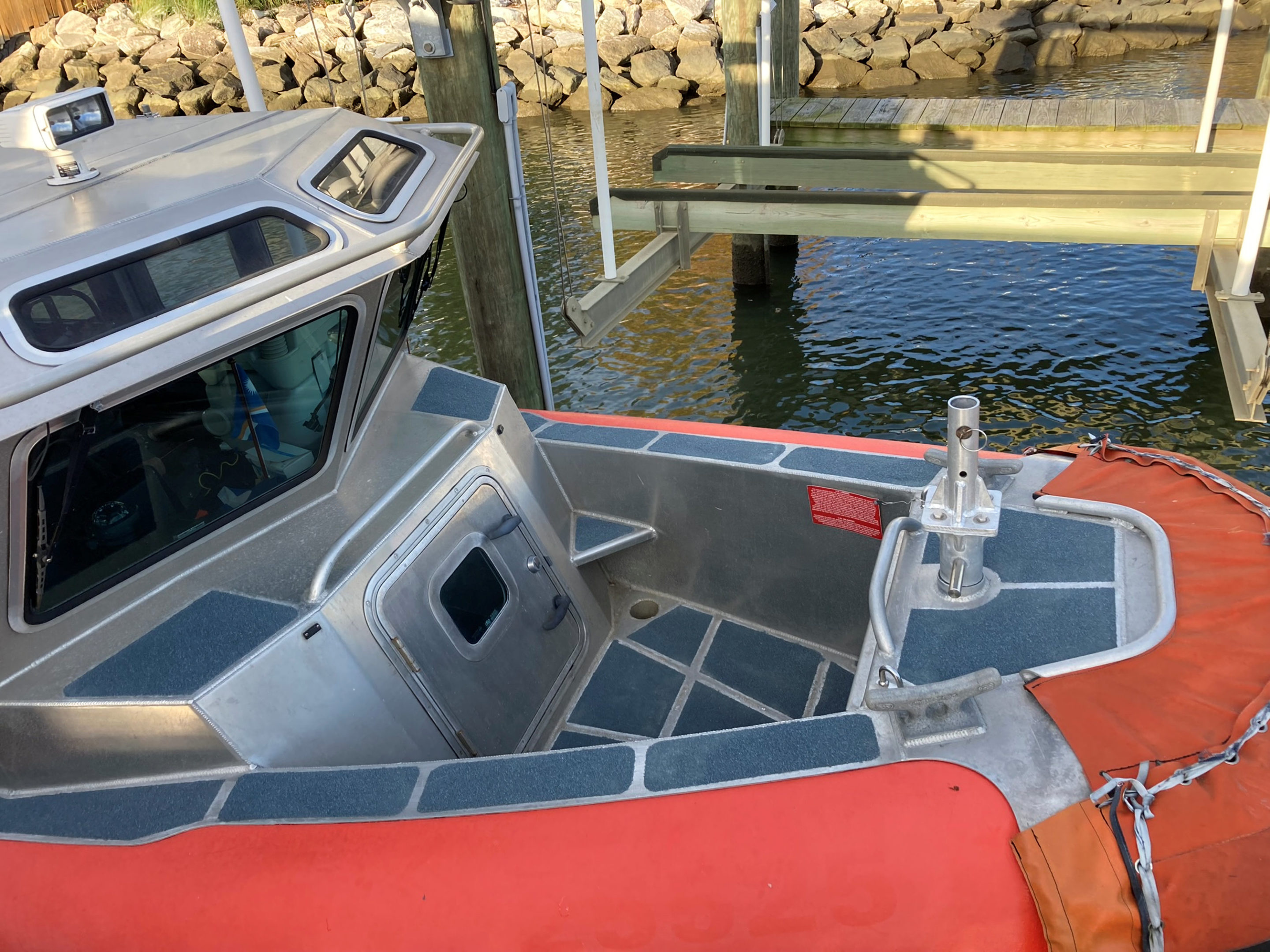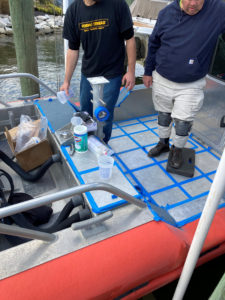New durable non-skid safety coating
In the maritime industry, any walking surface can pose a serious slip and fall risk, particularly on wet, rolling and pitching vessels buffeted by waves and wind gusts. Perhaps nowhere is this hazard more serious than on small workboats like tugs, fishing boats, diving boats, and response and rescue boats.

“The vessel is almost always wet and moving, and the crew is often handling equipment, so it is a high-risk place to work,” explains Jonathan Maiorine, who has 30 years of maritime industry experience, including more than 20 years’ active duty in the US Coast Guard. “Any slip and fall can result in someone becoming entangled in gear or machinery or going overboard, so good footing is essential,” he says. In the past, Maiorine has worked on commercial cargo vessels and later served as Vice President, Fleet Operations for International Registries, Inc. and its affiliates (IRI), which provide administrative and technical support to the Republic of the Marshall Islands Maritime Registry. He now operates his own maritime consulting company.
According to Maiorine, the most common technique for preventing slip and fall accidents in maritime applications is through the application of non-skid adhesive tape or reduced-epoxy coatings embedded with aggregate. However, with continual exposure to the sea and sun, tapes can peel off. Coatings and aggregate can also abrade away quickly, leading to frequent reapplication to maintain safety standards.
“Typical adhesive strips do not provide the aggressive traction needed in extreme weather conditions, wear quickly, and often need to be replaced. Conventional non-skid coatings also have a limited lifespan, and usually do not offer the range of embedded aggregate for good footing,” says Maiorine.
Fortunately, a new category of durable, high-tech, full-epoxy coating is dramatically increasing traction and improving maritime safety in a wide range of slip and fall prone areas such as decks, docks, and gangways. This new type of coating is designed to last for years even in harsh marine environments, which reduces the need for maintenance and replacement. The coating type can be quickly and easily applied without a primer, minimising cost and disruption.
Improving traction and safety
The Republic of the Marshall Islands (RMI) Maritime Administrator conducts annual safety inspections for vessels registered in its fleet and, as stated earlier, IRI provides administrative and technical support to the RMI Registry,
Recently, IRI replaced a worn conventional non-skid application on an old aluminium US Coast Guard Defender-class boat with a lasting, high-tech, all-epoxy coating that was showcased at the 2022 International WorkBoat Show. Aluminium workboats like the Defender-class boat are commonly used by a wide range of companies and agencies, such as the Coast Guard, fire departments, game wardens and police and sheriff departments.
Christian Worch, IRI’s Ship Desk Coordinator operates the Defender-class boat at the Annapolis Anchorage in Chesapeake Bay to transport inspectors to and from RMI-flagged vessels. Conducting the required RMI Flag State inspections at anchorage reduces interference with port and cargo operations when the ship moors at the terminal.
To disembark, the inspectors have to climb around the side of the workboat and stand on the bow gripping a handrail, while other personnel hold the boat against the larger vessel. The inspectors then climb up a pilot ladder to access the gangway.
Given the boat’s age and use, the non-skid adhesive tape previously applied to the decks and gunwales of the all-aluminium boat had degraded to the point where it no longer provided the traction necessary to safely take the inspectors out to the larger vessels they were evaluating.
“The original tread was worn and peeling, essentially non-existent, which posed a slip and fall risk. Since the workboat is not large, if an inspector slips, he or she could fall overboard. So, a high-performance non-slip surface is crucial to our operation,” explains Worch.
Non-skid solution
As a solution, IRI had the non-skid coating Form-A-Tread SL (Self Levelling) applied to the workboat in the same areas and patterns as the previous non-skid material. The all-epoxy safety product is a combination of a low-to-medium viscosity, 100% solids epoxy binder and a specialised aggregate.
The coating provides a very durable, slip-resistant surface on maritime walking surfaces like vessel decks and gangways as well as other large areas. It can be applied to aluminium, steel, wood, and other porous and non-porous substrates. The formulation, along with topically applied aggregate, is designed to last for years even when exposed to extreme weather, temperature, sea spray, sunlight and chemicals.
The coating is easy to mix and apply by hand and can be easily applied over welds or other irregularities, unlike adhesive products that can only be applied to perfectly flat surfaces. Installation is fast, customisable, and is typically ready for use in under four hours. After minimal surface preparation, the application of the epoxy only took one day.
In addition, another epoxy formulation designed to increase traction on stairs and ladders, called Form-A-Tread Original, was applied in specific areas such as the vessel operator’s footrest.
“I have seen many different variations of non-skid applications and I really like the non-skid, all-epoxy product applied to our workboat. The application was very neat, clean, and even across the boat. It looks very professional. After about six months, it looks like it was just applied yesterday,” says Worch.
]
The coating type can be quickly and easily applied without a primer, minimising cost and disruption
Maiorine was similarly impressed when he discovered the non-skid Form-A-Tread SL coating in the course of his work as a maritime industry consultant. He says he quickly recognised how the combination of improved traction and footing, along with less maintenance, could improve safety.
“I think this [all-epoxy coating] product is an excellent choice to improve safety and reduce recurring maintenance costs for any boat or dock. The maritime industry needs [a non-skid solution like] this,” says Maiorine, who recently joined Form-A-Tread Company as Director of Maritime Safety.
Positive response
The industry is responding positively as well. At the International WorkBoat Show in New Orleans late last year, commercial mariners responded to Form-A-Tread’s presentation, which featured its maritime projects, including docks, float platforms and IRI’s Defender-class boat. There has already been strong interest in the product for workboat applications and orders from vessel operators on the US East Coast, West Coast and Alaska.
As the maritime industry seeks to prevent slip and fall hazards as well as man overboard incidents across a range of vessel decks and walking surfaces, implementing durable, non-skid, all-epoxy coatings with heavy-duty aggregate will effectively improve safety in the long term without the need for frequent replacement.




